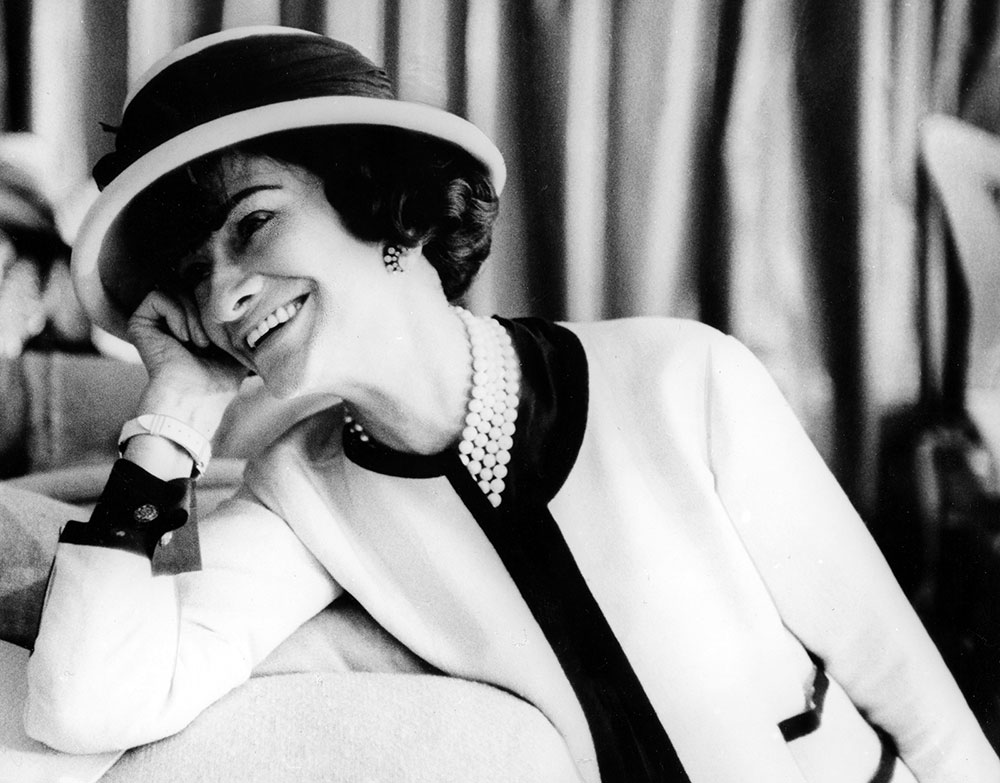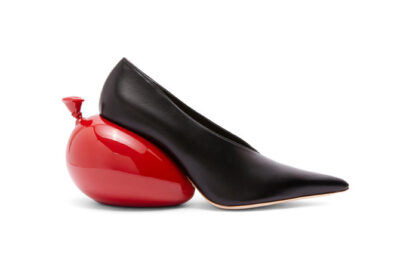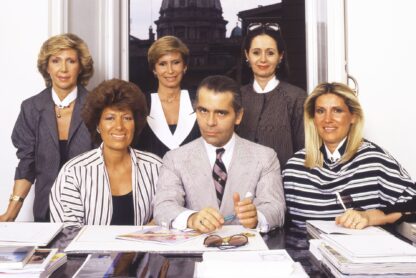Are you fascinated by the house of Chanel?
Do you want to land an internship or job at Chanel or simply learn more about the brand’s history?
In this article, we invite you to step into the world of the founder Gabrielle Coco Chanel. Let’s explore the 8 iconic designs she created for her eponymous brand.
8 Famous Designs Of Coco Chanel
Gabrielle Coco Chanel was a pioneering fashion designer who introduced menswear pieces and sportswear into women’s closets. Coco Chanel significantly pushed societal norms and beauty standards. Bringing a sense of elegance paired with comfort and timelessness to the designs, the legendary couturière left a profound and lasting impact on how women dress and the fashion industry in general.
Chanel Jersey Sweater
In 1913, one year after opening her boutique in Deauville, Coco Chanel began selling a line of sportswear made of jersey. This fabric had previously been used to make men’s underwear. Coco Chanel became the first designer to use jersey in womenswear.
Though it may not be Coco Chanel’s most famous design, it played a significant part in the evolution of womenswear. Chanel’s jersey sweater became the first garment one pulled over their head. It eliminated the effort for women to tie it and deal with lots of lace and buttons. No wonder why it was such a revolutionary item back in the 1910s!
“This designer made Jersey what it is today – we hope she’s satisfied. It’s almost as much part of our lives as blue serge is” – Vogue wrote on Chanel in 1917. Chanel said that her designs in jersey “were designed for a woman, which at the time, didn’t exist. But “One can never be too modern,” she said in 1961.

“Jersey is the hardest fabric to work with, it’s a poor fabric; Lord, do I know it! I started out with it”.
COCO CHANEL
Chanel Breton Shirt
While on a vacation in the French Riveria, Coco Chanel noticed the French sailors’ blue and white striped shirts. Inspired, she decided to create her own version of the Breton shirt and incorporated it into her nautical collection in 1917.
After the jersey sweater, the Breton shirt was another piece that screamed modernity and offered greater comfort than other constrictive styles. The piece became a staple of her future collections and her own wardrobe.

“Fashion changes, but style endures.”
COCO CHANEL
The Little Black Dress
Although she did not design the very first Little Black Dress, Coco Chanel was the one who made it widely popular, and desirable when she introduced it in 1926 in the pages of Vogue.

Chanel’s little black dress was revolutionary for many reasons.
Before the 1920s, the black dress was reserved for funerals and mourning, but Coco Chanel took the black dress of this context and transformed it into a piece that could be worn on multiple occasions. It was the first dress of its kind not to be labeled as evening or day wear. The couturière also pioneered the use of one color only in a single garment.
The design was practical yet elegant, with a fluid, straight-lined silhouette, which was opposed to constricted clothes that had dominated the previous period with tight corsets and bustle skirts. Vogue called the LBD ‘Chanel’s Ford’, meaning it was simple and accessible to women of all classes. Coco Chanel confirmed: “Thanks to me, they [non-wealthy] can walk around like millionaires.”
Another reason for French couturière LBD’s success was timing. The dress was released in the Great Depression era when simple and affordable designs were key. It remained the perfect outfit choice during the Second World War, which caused severe rationing on textiles because it didn’t need an excessive amount of fabrics to be created.
The little black dress became a stand-out piece and one of the most famous designs of Coco Chanel. We cannot imagine a world without today. It is the epitome of style and class, and an essential in every woman’s wardrobe.

“Scheherezade is easy; a little black dress is difficult.”
COCO CHANEL
Chanel Tweed Suit
Coco Chanel discovered the tweed while living in Scotland in the mid-1920s. She was dating the Duke of Westminster and occasionally borrowed his clothes because they felt practical. This set the groundwork for working with tweed, first introduced in 1925.
What’s curious is that this fabric used to be reserved for menswear, but it was so comfortable that Chanel started using it in womenswear but mixed it with silk and wool to create a lighter and more polished fabric. Just as with everything she designed, this item was born with the desire to liberate women from the conventional norms of dressing up and offer practical, yet feminine clothes.
However, it was not until 1954 that the tweed jacket was presented to the world for the first time, on the occasion of the reopening of the headquarters of the Chanel House, at 31 rue Cambon in Paris.
The suits were straight and structured, with a single seam down the center-back, and blurred the lines between masculine and feminine. Shockingly, it wasn’t easy to promote the Tweed Suit among French women because the piece contrasted with Christian Dior’s in-vogue New Look. But Americans loved it. For instance, the former First Lady of the United States Jackie Kennedy wore the Tweed Jacket in 1963 on the day of the President’s death. Soon, the tweed jacket revolutionized women’s fashion and became an adored item adopted by many celebrities and fashionistas alike.

“I wanted to dress them [women] in suits that make them feel at ease, but that still emphasize femininity.”
COCO CHANEL
Chanel Self-tying Bow
Coco Chanel liked to accentuate different parts of a woman’s body. And so, she created the self-tying bow – a multiple-purpose piece that could mark the hips, the shoulders, the hair…wherever one would want to tie it.
Chanel’s self-tying bow wasn’t just a simple accessory, serving as a nice final touch to complete the look; its contribution to womenswear was way more significant. Thanks to the self-tying bow, women no longer had to rely on someone to help them tie their dresses like in the Victorian era. With one practical accessory, they could enhance their silhouettes by themselves in a matter of seconds.

“Simplicity is the keynote of all true elegance.”
COCO CHANEL
Chanel 2.55 Bag
The first time Gabrielle Coco Chanel introduced her iconic 2.55 bag was in 1929. The exterior was initially made of quilted wool, inspired by the saddle blankets at the horse races she frequented.
The 2.55 was a revolutionary handbag. Before Chanel’s masterpiece, women’s bags were designed to be carried by a top handle or as a clutch. The couturière had the idea to add a shoulder strap, inspired by the straps found on soldiers’ bags. Chanel freed women from the constraints of the impractical clutch, leaving their hands free or simply putting them in their pockets, as Coco herself liked to do.
“I got fed up with holding my purses in my hands and losing them, so I added a strap and carried them over my shoulder,” Chanel once said about her creation.
The possibility to move without feeling restricted by clothes and accessories is largely attributed to this legendary woman. Her bag was unlike anything that the world had seen before, and it’s no surprise that it quickly gained popularity and became one of the house’s flagship products.
In 1955, a year after Gabrielle Coco Chanel reopened her boutique after a temporary closure during the Second World War, she reintroduced her iconic double flap bag, naming it 2.55 after the date of its creation – February 1955.

“I got fed up with holding my purses in my hands and losing them, so I added a strap and carried them over my shoulder.”
COCO CHANEL
Chanel Two-Tone Slingbacks And Flats
Coco Chanel wanted to create the perfect shoe that women could wear day and night, for sports, work, or leisure, and move around without feeling any discomfort. And so, in 1957 she released two-tone, beige, and black slingbacks with a 5cm heel. The beige color provided an elongated and slimming effect, while the black color optically shortened the foot and protected the toe from long-term wear. Later in the year, Coco Chanel released the same two-tone ballet flats.

“The pinnacle of elegance”
COCO CHANEL
Chanel Pearl Necklace
Although we might think of Gabrielle Coco Chanel as a clothing and handbag designer first, let’s not forget she also created jewelry. The designer enjoyed combining fine jewelry with clothing, making it a trend in the fashion world. The pearl necklace was Coco Chanel’s most iconic piece, earning her the nickname of the “Queen of Gems”.
Chanel purposely designed her necklace using fake pearls because the real ones were such a rarity and expensive thing that people were too afraid to wear them on the street. Therefore, Coco Chanel had the idea to offer them a safe, fake version. “It’s disgusting to walk around with millions dollars around the neck because one happens to be rich. I only like fake jewellery….because it’s provocative,” she once confessed.

“A woman needs ropes and ropes of pearls.”
COCO CHANEL
Coco Chanel was a master designer who designed a complete wardrobe and lifestyle for modern women. Not only did she introduce innovative and practical garments, but she also completed her looks with timeless accessories.
Which is your favorite Chanel creation?
If you want to learn about the history of fashion, the careers and interesting facts about designers and other professionals, and iconic fashion pieces, subscribe to our daily newsletter 365 days of fashion.








I have patent the technology groundbreaking mind blowing. New bottle design. Would like to work on 57th St. corporate in research and development R&D
Discover the iconic designs that made Coco Chanel a legend in fashion history!